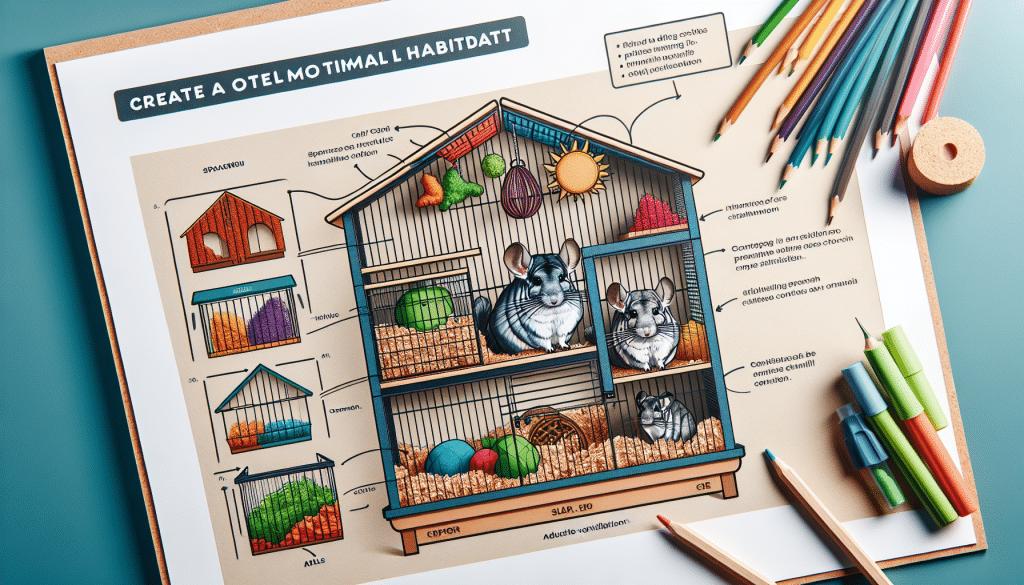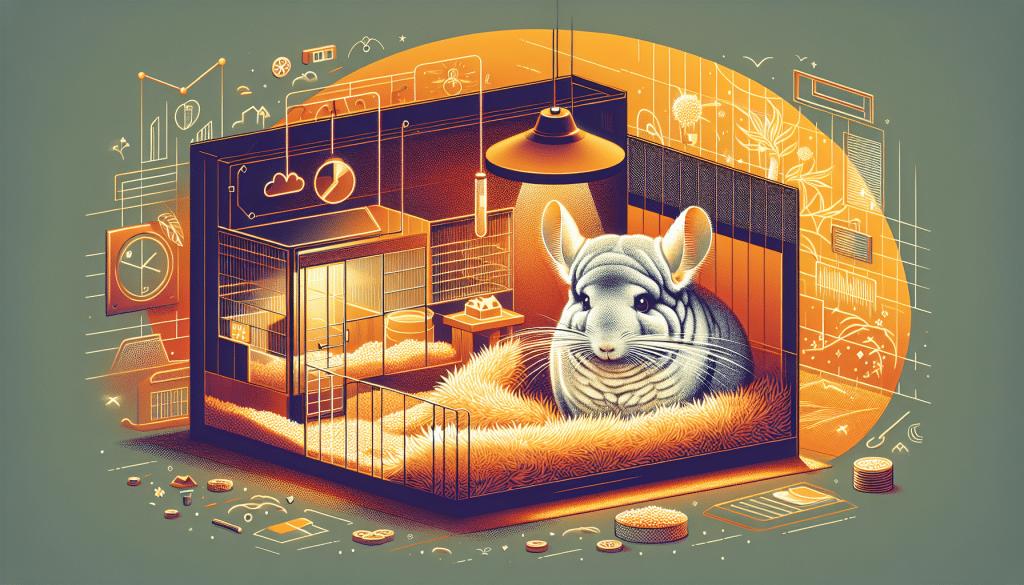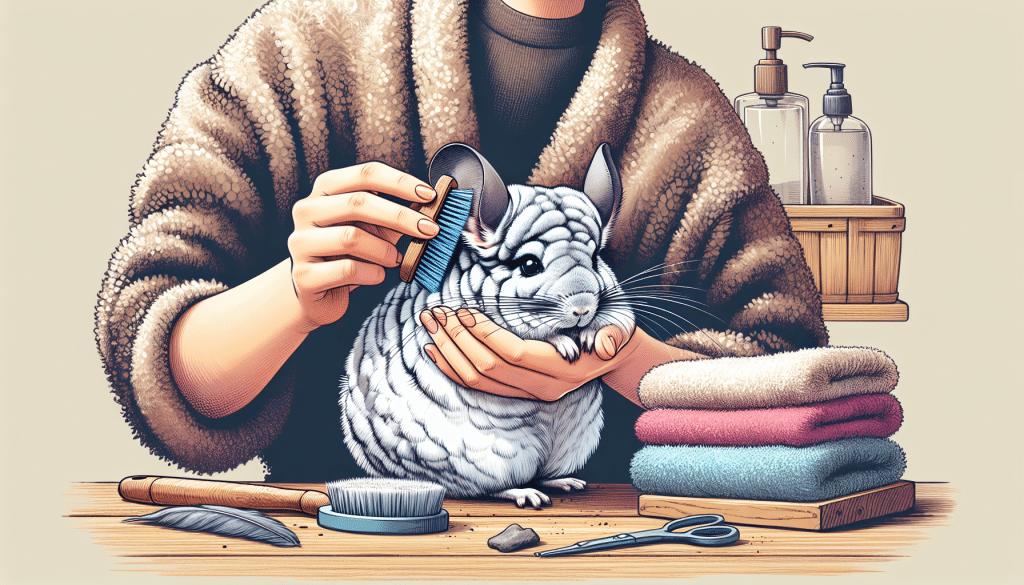So, you’ve just become the proud owner of a chinchilla, huh? Well, first off, congratulations! These fluffy little creatures can make fantastic companions. But, before you dive into the world of chinchilla ownership headfirst, there are a few essential tips you’ll want to keep in mind. From the proper diet to creating a suitable living environment, this article will guide you through everything you need to know in order to care for your new furry friend. So, let’s get started!
Understanding Chinchilla Basics
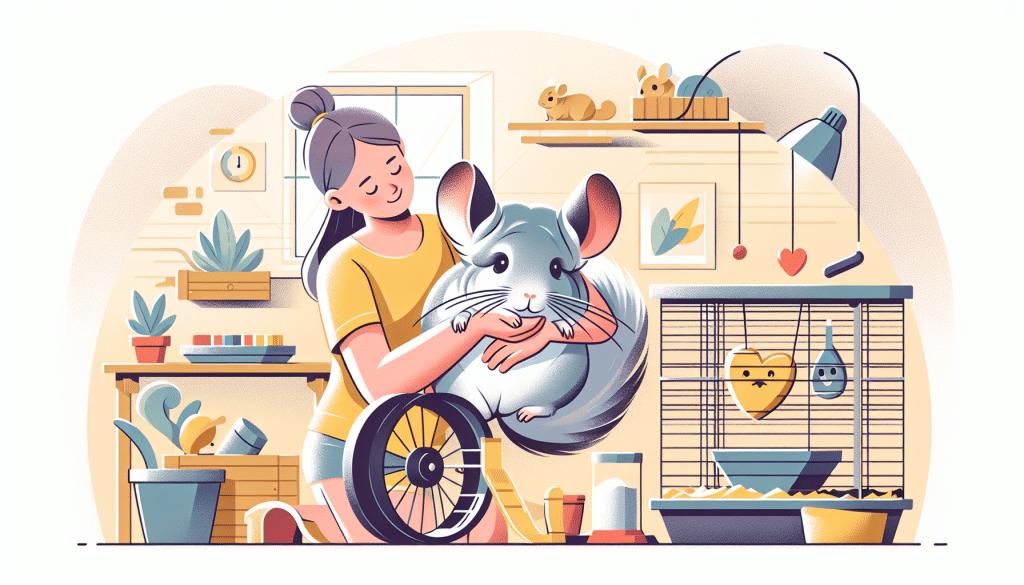
What is a Chinchilla?
If you’re considering getting a pet chinchilla, it’s essential to understand what these adorable creatures are all about. Chinchillas are small rodents that are native to the Andes Mountains in South America. They are known for their soft and dense fur, which comes in various colors such as gray, white, beige, and black. Chinchillas are crepuscular animals, meaning they are most active during dawn and dusk. They have a lifespan of around 10 to 20 years, so owning a chinchilla is a long-term commitment.
Chinchilla Natural Habitats
In their natural habitat, chinchillas live in rocky, dry areas with sparse vegetation. The Andes Mountains provide them with ideal conditions, including cool temperatures and low humidity. Chinchillas are excellent jumpers and climbers, allowing them to navigate their natural rocky terrain with ease. Recreating a similar environment for your pet chinchilla is crucial to ensure their physical and mental well-being.
Common Chinchilla Traits
Before bringing a chinchilla into your home, it’s important to understand their common traits. Chinchillas have a strong need for physical exercise, mental stimulation, and social interaction. They are curious and intelligent animals that require a stimulating environment to prevent boredom and destructive behavior. Additionally, chinchillas have sensitive respiratory systems, so their living space should be free of dust, smoke, and other pollutants. Understanding these traits will help you provide the best care for your furry friend.
Creating an Ideal Living Environment
Choosing the Right Cage Size
When it comes to chinchillas, bigger is better when selecting a cage. Chinchillas need plenty of space to jump, climb, and exercise. A multi-level cage with ramps and platforms provides the perfect environment for your chinchilla to explore and play. The minimum recommended cage size for one chinchilla is 3 feet by 2 feet by 2 feet. However, if you have multiple chinchillas, you’ll need a larger cage to accommodate their social interaction and exercise needs.
Correct Cage Location
Choosing the right location for your chinchilla’s cage is essential for their well-being. Avoid placing the cage in direct sunlight or near drafts, as chinchillas are sensitive to temperature extremes. Opt for a quiet area of your home where your chinchilla can have some peace and quiet. Additionally, keeping the cage away from other pets or loud noises will help reduce stress for your chinchilla.
Essential Cage Accessories
To create an ideal living environment for your chinchilla, you’ll need to provide them with essential cage accessories. These include a solid flooring, as wire mesh can cause foot and leg injuries. Provide various levels and platforms for your chinchilla to jump on and explore. Additionally, ensure the cage has hiding spots such as tunnels or boxes to give your chinchilla a sense of security. A chinchilla-safe wheel is also a great addition to provide them with exercise.
Providing a Proper Diet
Understanding Chinchilla Dietary Needs
A proper diet is crucial for your chinchilla’s health and well-being. Chinchillas are herbivores, meaning their diet should consist mainly of hay and fresh vegetables. Hay provides essential fiber for their digestive system and helps wear down their ever-growing teeth. Fresh vegetables such as kale, lettuce, and carrots should be offered in small amounts as treats, as they can be high in sugar. Avoid giving your chinchilla sugary or fatty foods, as they can lead to digestive issues and obesity.
Choosing the Right Food
When selecting hay for your chinchilla, opt for high-quality timothy hay or orchard grass. These hay varieties are low in calcium and help prevent urinary tract issues. Pellets specially formulated for chinchillas should also be included in their diet. These pellets contain essential vitamins and minerals that may be lacking in their hay and vegetable diet. Always make sure to provide fresh and clean food, and remove any uneaten vegetables within a few hours to prevent spoilage.
The Importance of Fresh Water
Water is essential for any living creature, and chinchillas are no exception. Always provide your chinchilla with fresh, clean water in a sturdy water bottle attached to the cage. Chinchillas have a tendency to knock over water bowls, so a water bottle is a safer option. Check the water bottle daily to ensure it’s working properly and refill it as needed. Regularly clean the water bottle to prevent bacteria growth.

Safe and Unsafe Treats for Chinchillas
Chinchillas love treats, but it’s important to choose them wisely. Safe treats for chinchillas include small portions of dried fruits, such as apple or raisins. However, treats should only make up a small portion of their diet to prevent weight gain and digestive problems. Avoid giving your chinchilla treats that are high in sugar or fat, as they can lead to health issues. Chocolate, caffeine, and processed foods should never be given to chinchillas, as they are toxic to them.
Optimizing Chinchilla Personal Hygiene
Proper Chinchilla Dust Baths
Chinchillas are known for their cleanliness and love for dust baths. Dust baths are essential for chinchillas to maintain their fur and skin health. Fill a shallow container with chinchilla dust, which is specifically formulated to help absorb oils and moisture from their fur. Offer the dust bath to your chinchilla a few times a week for about 10-15 minutes each session. Avoid using water to clean your chinchilla, as wet fur can lead to skin issues.
Regular Coat Brushing
Brushing your chinchilla’s coat regularly not only helps keep their fur clean but also prevents the formation of mats and hairballs. Use a soft-bristled brush specifically designed for chinchillas to gently remove loose fur and tangles. Brushing should be done at least once a week to keep your chinchilla’s coat in top condition. If you notice any abnormal hair loss or skin issues during grooming, consult a veterinarian for further guidance.
Chinchilla Dental Hygiene
Chinchillas have continuously growing teeth, so proper dental care is crucial. Provide them with wooden chew toys and blocks to wear down their teeth naturally. This chewing action helps prevent overgrowth and dental issues. Avoid giving your chinchilla treats or food that are too hard, as they can cause dental fractures. Regularly inspect your chinchilla’s teeth for signs of overgrowth or abnormalities. If you notice any dental problems, consult a veterinarian for appropriate care.
Keeping Chinchillas Physically Active
Importance of Physical Exercise
Chinchillas are active creatures that require physical exercise to maintain their overall health. Physical activity not only helps them stay fit but also prevents obesity, respiratory issues, and muscle atrophy. Allow your chinchilla to have supervised out-of-cage playtime in a safe and chinchilla-proofed area. This could include a playpen, a bathroom, or a specially designated chinchilla room. Encourage them to explore, jump, and climb using toys and obstacles.
Providing Safe Toys
To keep your chinchilla physically active, it’s important to provide them with safe toys. Opt for toys made from chinchilla-safe materials such as untreated wood, woven grass, or safe plastics. Chew toys, tunnels, and platforms are great options to engage your chinchilla’s natural instincts. Rotate and introduce new toys regularly to prevent boredom. Always inspect toys for any signs of damage or wear and replace them as needed to prevent any potential hazards.
Interactive Playtime with Owners
Chinchillas are social animals that enjoy human interaction. Spending quality playtime with your chinchilla not only provides physical exercise but also promotes bonding and mental stimulation. Use interactive toys such as ping pong balls or tunnels to engage your chinchilla in play. Be gentle and patient during playtime, as chinchillas can be easily startled. Supervise all interactions to ensure the safety of both your chinchilla and yourself.
Ensuring Chinchilla Mental Stimulation
Significance of Mental Engagement
Chinchillas are intelligent creatures that thrive on mental stimulation. Keeping their minds active helps prevent boredom and destructive behaviors. Engaging your chinchilla mentally not only enhances their overall well-being but also strengthens the bond between you and your furry friend. Mental stimulation can be achieved through interactive toys, puzzle feeders, and providing a stimulating environment.
Toys that Encourage Intellectual Exercise
Toys that encourage intellectual exercise are a great way to keep your chinchilla’s mind sharp. Puzzle feeders, treat-dispensing toys, and foraging toys are excellent options. These toys require your chinchilla to work for their treats or find hidden rewards, keeping them mentally engaged. Rotate and introduce new toys regularly to keep the challenge level up. Remember to always choose toys made from safe materials to ensure the safety of your chinchilla.
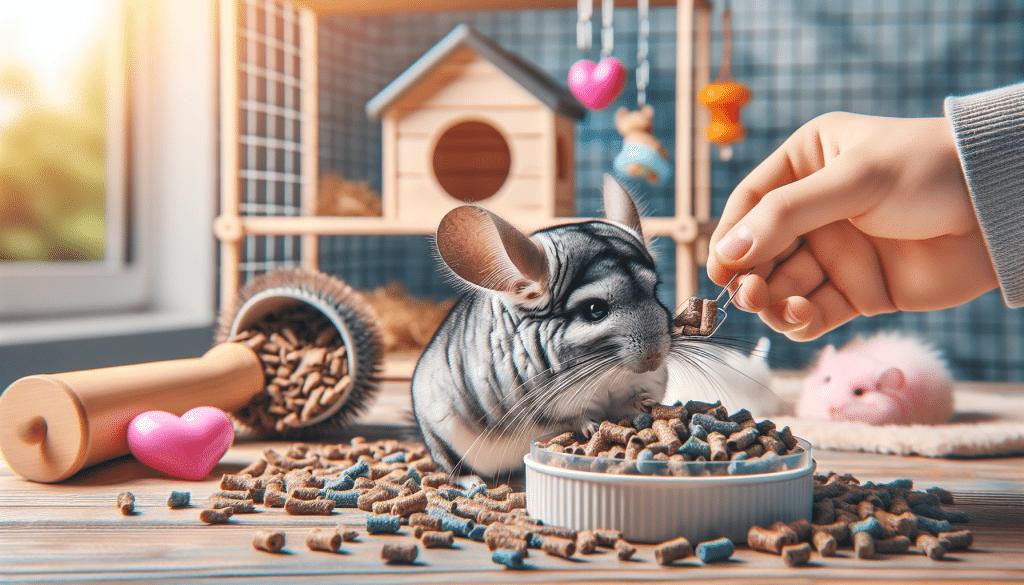
Setting up Interactive Environments
Creating interactive environments within your chinchilla’s living space can further enhance their mental stimulation. Provide various levels, platforms, and tunnels for your chinchilla to explore and navigate. Hide treats or toys in different areas to encourage them to search and discover. Rearrange the layout of their cage or play area periodically to keep things interesting. Providing a stimulating environment ensures your chinchilla’s mental needs are met.
Handling and Socializing Chinchillas
Proper Ways to Handle Chinchillas
When handling your chinchilla, it’s important to do so correctly to ensure their safety and well-being. Place one hand under their chest and the other hand supporting their hindquarters. Never pick up a chinchilla by their tail, as it can cause serious injury. Approach your chinchilla slowly and gently, allowing them to get comfortable with your presence. Always supervise interactions with children or other pets to prevent any accidents.
Understanding Chinchilla Social Needs
Chinchillas are social animals that enjoy the company of their own kind. If you have multiple chinchillas, make sure to provide them with adequate socialization opportunities. However, introducing new chinchillas should be done gradually and supervised to prevent aggression or territorial issues. If you have a single chinchilla, it’s important to spend quality time with them to fulfill their social needs. Regular interaction with their human companions is essential for their well-being.
Introducing New Chinchillas into a Current Household
When introducing a new chinchilla into a current household, it’s important to do so slowly and with caution. Start by placing the new chinchilla’s cage in the same room as the current chinchilla(s) to allow them to get used to each other’s presence. Gradually move the cages closer over time, allowing them to interact through the bars. Supervised play sessions in a neutral area can eventually be introduced. Patience and careful observation are key when introducing new chinchillas to avoid any potential conflicts.
Monitoring Chinchilla Health Regularly
Regular Health Check-ups
Regular health check-ups with a veterinarian who specializes in exotic pets are essential for your chinchilla’s well-being. Schedule annual check-ups to ensure your chinchilla is healthy and free from any underlying health issues. During these visits, the veterinarian will perform a thorough physical examination, check their teeth, and address any concerns or questions you may have. Regular health check-ups allow for early detection and prompt treatment of any potential health problems.
Common Signs of Illness
As a responsible chinchilla owner, being vigilant about your chinchilla’s health is crucial. Keep a close eye on any changes in their behavior, appetite, water intake, or bathroom habits. Common signs of illness in chinchillas include sneezing, coughing, hunched posture, lethargy, weight loss, diarrhea, or excessive thirst. If you notice any of these signs or any other unusual symptoms, contact your veterinarian immediately for guidance and advice.
Choosing the Right Veterinarian for Chinchillas
When it comes to choosing a veterinarian for your chinchilla, it’s important to find one with experience in treating exotic pets. Chinchillas have unique anatomical and physiological needs, so selecting a veterinarian knowledgeable in their care is crucial. Do your research and ask for recommendations from other chinchilla owners or exotic pet forums. A qualified veterinarian will provide proper care, diagnosis, and treatment options tailored to your chinchilla’s specific needs.
Dealing with Chinchilla Behavioral Issues
Understanding Chinchilla Behaviors
Chinchillas, like any other pet, can exhibit various behaviors that may need attention or modification. It’s important to understand the underlying reasons behind these behaviors to address them effectively. Common behavioral issues in chinchillas include chewing on cage bars, excessive vocalization, aggression towards other chinchillas or humans, and excessive hiding. Identifying the cause of these behaviors, such as boredom or stress, will help in finding appropriate solutions.
Dealing with Aggressive Behaviors
If your chinchilla displays aggressive behaviors, it’s important to address the issue promptly and effectively. Aggressiveness can be a sign of fear, territoriality, or potential health issues. Start by ensuring their living environment is optimal and free from any stressors. Gradual socialization, desensitization, and positive reinforcement can help modify aggressive behaviors. Seek the guidance of a veterinarian or an animal behaviorist for professional advice specific to your chinchilla’s situation.
Training Chinchillas to Correct Negative Behaviors
Training your chinchilla can help correct negative behaviors and reinforce positive ones. Positive reinforcement techniques, such as clicker training or treats, can be used to encourage desired behaviors. For example, if your chinchilla tends to chew on cage bars, provide them with chinchilla-safe chew toys and reward them when they chew on those instead. Consistency, patience, and gentle handling are key when training your chinchilla. Avoid any form of punishment or physical force, as it can cause fear and mistrust.
Understanding Chinchilla Lifespan and Aging
Chinchilla Life Expectancy
Chinchillas have a relatively long lifespan compared to many other small mammals. On average, a well-cared-for chinchilla can live anywhere from 10 to 20 years. Providing optimal care in terms of diet, exercise, mental stimulation, and regular veterinary check-ups can contribute to a longer and healthier life for your chinchilla.
Caring for Senior Chinchillas
As your chinchilla ages, their needs may change, and additional care may be required. Keep an eye out for any signs of age-related health issues, such as arthritis or dental problems. Ensure their living environment remains safe and accessible, providing easy access to food, water, and resting areas. Adjust their diet as needed, focusing on softer foods if they have dental issues. Regular veterinary check-ups become even more important during their senior years to detect and manage age-related conditions.
Recognizing the Signs of a Dying Chinchilla
The loss of a beloved chinchilla can be devastating, and it’s important to be prepared for their end-of-life stage. As chinchillas age, they become more susceptible to illness and diseases. Signs of a dying chinchilla may include extreme lethargy, loss of appetite, difficulty breathing, or inability to move. If you notice any of these signs, it’s important to consult a veterinarian to determine the best course of action. Providing comfort and support during their final days is essential.

